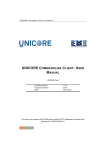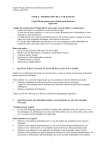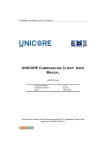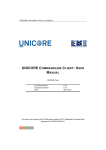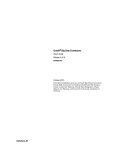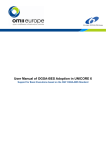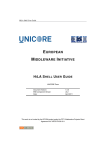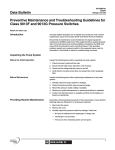Download RUS Accounting for UNICORE
Transcript
RUS Accounting for UNICORE
RUS ACCOUNTING FOR UNICORE
Marcin Lewandowski
Document Version:
Component Version:
Date:
1.0.1
1.3.1
13 05 2011
RUS Accounting for UNICORE
Contents
1
2
Introduction
1
1.1
1
ActiveMQ Broker . . . . . . . . . . . . . . . . . . . . . . . . . . . . . . . . .
Installation and configuration
3
2.1
rus-service . . . . . . . . . . . . . . . . . . . . . . . . . . . . . . . . . . . . .
3
2.2
rus-job-processor . . . . . . . . . . . . . . . . . . . . . . . . . . . . . . . . .
5
2.3
rus-bssadapter . . . . . . . . . . . . . . . . . . . . . . . . . . . . . . . . . . .
6
RUS Accounting for UNICORE
1
This is a RUS Accounting user manual providing information on running and using the accounting for UNICORE.
1
Introduction
This user manual covers UNICORE accounting system developed in ICM. The main modules
of the system are:
• rus-job-processor - UNICORE job processor which allows to collect data from job, convert
it into UsageRecord format and send via JMS. For UNICORE 6.3 use rus-job-processor in
version 1.2.0 For UNICORE 6.4 use rus-job-processor in version 1.3.0+.
• rus-service - the extension which should be deployed as additional service on Unicore/X
installation. The service maintains a database of usage records and provides a RUS (Resource
Usage Service - OGF draft specification) interface. What is more the rus-service is consumer
of records provided by rus-job-processor and rus-bssadapter.
• rus-bssadapter - the standalone daemon which is installed on Batch System (or LRMS)
server. Usually this is the same machine where UNICORE TSI runs. It monitors accounting
logs of the BSS and forward data via JMS.
• rus-export-bat - it’s plugin for rus-service, which allows to export UR records via JMS using
BAT format.
• rus-ucc-plugin - ucc plugin for quering rus-service
• rus-ur-site - web portal which allows presentation of gathered data
• rus-usage-logger-feeder - generates archival accounting data from Unicore log and sent to
JMS queue (requires UsageLogger format from at least Unicore 6.4).
The rus-service merges data received from the rus-job-processor and from rus-bssadapter.
1.1
ActiveMQ Broker
The central point of data exchange is ActiveMQ broker. You can just download and extract it
from ActiveMQ official web site. There is no need to perform any extra configuration. However
you can add distinct uses with priviledges to write and read from queues.
Note
rus-export-bat contains plugin which converts UsageRecords into BAT format, which in used
as PL-Grid internal format to exchange data between UNICORE accounting and BAT portal.
BAT portal which used in PL-Grid is written using GWT, and now it has almost nothing in
common with Baltic Grid.
RUS Accounting for UNICORE
2
Note
rus-service and rus-job-processor can be deployed into same UNICORE server. However a
good practise is to deploy them on separate servers. You just need two instances of UNICORE
server. Job-processor needs to be installed on server, which accepts job requests. Server
which hosts rus-server will be an auxiliary instance. After underlaying persistance layer of russerver will contain lots of data, it can have small performance impact. However it was tested
that having about 4,000,000 records in db has almost unnoticeable impact on performance.
RUS Accounting for UNICORE
2
3
Installation and configuration
2.1
rus-service
We assume here that ${unicorex} is the installation directory of Unicore/X server.
1. Install accounting libraries in Unicore/X. The simplest way to achieve it is to copy the
contents of distribution’s lib/ directory into ${unicorex}/lib. However a good
practice is to keep extensions’ libraries in a separate directory. This involves bit more
work:
a. Create a new directory ${unicorex}/lib.extra
b. Copy the contents of distribution’s lib/ directory into ${unicorex}/lib.extra.
c. Modify ${unicorex}/bin/start.sh to scan also lib.extra directory for
libraries.
To do so change the following lines:
...
JARS=lib/*.jar
CP=
for JAR in $JARS ; do
...
to:
...
JARS=lib/*.jar
JARS2=lib.extra/*.jar
CP=
for JAR in $JARS $JARS2 ; do
...
2. Add RUS service to ${unicorex}/conf/wsrflife.xml.
<property name="uas.security.accesscontrol.RUS" value="true"/>
<service name="RUS" wsrf="false" persistent="false">
<interface class="pl.edu.icm.unicore.accounting.commons.ws.ResourceUsagePort
<implementation class="pl.edu.icm.unicore.accounting.service.ws.ResourceUsag
</service>
3. Copy the contents of the distribution’s conf/ directory to the directory ${unicorex}/conf
(i.e. the rus directory which can be found there).
4. Configure ActiveMQ Broker properties in ${unicorex}/conf/rus/service.properties.
Additionally you can configure database properties in this file.
RUS Accounting for UNICORE
4
5. Append pl.edu.icm.unicore.accounting.service.Bootstrap to uas.onstartup
property in ${unicorex}/conf/uas.config. For example:
uas.onstartup=de.fzj.unicore.uas.util.DefaultOnStartup \
de.fzj.unicore.cisprovider.impl.InitOnStartup \
pl.edu.icm.unicore.accounting.service.Bootstrap
6. Configure authorization of the RUS service.
You have two options prepared: to use role based authorization or to use DN-based authorization. Of course you can invent your own authorization scheme. The file rus-xamlrules.xmlf contains example authorization rules for the role based authZ. One DN-based
condition is commented. Note that the example XACML policy provides two entries: one
for authorization of query operations (by default only allowed for users with admin role)
and the latter for insertion of records. You can modify both.
To install authorization rules paste the rus-xaml-rules.xmlf file contents to the ${unicorex}/conf/security_p
file. The rules should be placed at the end of the file just BEFORE the last rule: <Rule
RuleId="FinalRule" Effect="Deny"/>
To use role based authorization set the role attribute of the UsageRecord provider identity
to the value used in XACML policy (by default it is bssaccounting). Of course set it in
the attribute store you use (XUUDB or UVOS or . . . ).
If you want to use DN based authorization then replace role condition with DN condition
and enter DN of your records provider identity.
(Note: in default configuration records from rus-job-processor and rus-bss-adapter are
fetched using JMS, so you don’t have to configure XAMCL policy to allow records insertions).
7. Increase available memory in Unicore/X to at least 160MB. This setting is available in
${unicorex}/bin/start.sh
# Memory for the VM
MEM=-Xmx128m
8. Restart Unicore/X.
Logging
In
order
to
enable
debug
mode
add
following
${unicorex}/conf/logging.properties:
log4j.logger.pl.edu.icm.unicore.accounting=DEBUG
line
to
the
RUS Accounting for UNICORE
5
Using MySQL instead of H2.
There’s possibility to use MySQL as storage instead of H2 (which is default setting). In order
to change underlying DBMS:
Edit
${unicorex}/conf/rus/sqlconfig.xml:
Comment
lines
related to h2 and uncomment mysql section.
Verify connection properties in:
${unicorex}/conf/rus/service.properties.
Download and copy MySQL connector to ${unicorex}/lib/
We support connectors in versions: 5.X.X+.
2.2
rus-job-processor
We assume here that ${unicorex} is the installation directory of Unicore/X server.
1. Install accounting libraries in Unicore/X. The simplest way to achieve it is to copy the
contents of distribution’s lib/ directory into ${unicorex}/lib. However a good
practice is to keep extensions’ libraries in a separate directory. This involves bit more
work:
a. Create a new directory ${unicorex}/lib.extra
b. Copy the contents of distribution’s lib/ directory into ${unicorex}/lib.extra.
c. Modify ${unicorex}/bin/start.sh to scan also lib.extra directory for
libraries. To do so change the following lines:
...
JARS=lib/*.jar
CP=
for JAR in $JARS ; do
...
to:
...
JARS=lib/*.jar
JARS2=lib.extra/*.jar
CP=
for JAR in $JARS $JARS2 ; do
...
2. Add job processor which accounts job stages to the ${unicorex}/conf/xnjs_legacy.xml
file. The following line must be added:
<eng:Processor>pl.edu.icm.unicore.accounting.processor.AccountingJobProcessor<
into the section <eng:ProcessingChain actionType="JSDL" ...>. The line
should be added as the last entry (typically after <eng:Processor>de.fzj.unicore.xnjs.ems.process
entry).
RUS Accounting for UNICORE
6
3. Record merge is performed based on BSS Machine hostname. Make sure that property
CLASSICTSI.machine in xnjs_legacy.xml equals to hostname setup by BSS
Adapter. To override CLASSICTSI.machine property add RUS.bssMachine property in xnjs_legacy.xml. On BSS Adapter side you can manually alter this property
by updating rus.service.bssHostname in conf/rus_bssadapter.conf.
(equals is defined as string equal, so node113.domain.com NOT equals node113)
4. Configure JMS connection properties in ${unicorex}/conf/xnjs_legacy.xml.
You can add following properties:
<eng:Property
<eng:Property
<eng:Property
<eng:Property
<eng:Property
<eng:Property
<eng:Property
<eng:Property
name="RUS.PROCESSOR.jms.url" value="tcp://localhost:61616"/>
name="RUS.PROCESSOR.jms.queue" value="ur-parts"/>
name="RUS.PROCESSOR.jms.username" value=""/>
name="RUS.PROCESSOR.jms.password" value=""/>
name="RUS.PROCESSOR.jms.keystore" value=""/>
name="RUS.PROCESSOR.jms.keystore.password" value=""/>
name="RUS.PROCESSOR.jms.truststore" value=""/>
name="RUS.PROCESSOR.jms.truststore.password" value=""/>
Only jms.url and jms.queue are required.
5. Restart Unicore/X.
Logging
In
order
to
enable
debug
mode
add
following
line
to
the
${unicorex}/conf/logging.properties:
log4j.logger.pl.edu.icm.unicore.accounting=DEBUG
2.3
rus-bssadapter
1. Unpack the installation archive and place the contained folder in the proper destination
on the same machine where Batch System Server (BSS) resides. Below we refer to the
folder where the unpacked distribution resides with ${installPath}
2. Update ${installPath}/conf/rus_bssadapter.conf by setting paths, ActiveMQ Broker location and SSL configuration (which is optional)
3. Record merge is performed based on BSS Machine hostname. Make sure that property
CLASSICTSI.machine in xnjs_legacy.xml equals to hostname setup by BSS
Adapter. To override CLASSICTSI.machine property add RUS.bssMachine property in xnjs_legacy.xml. On BSS Adapter side you can manually alter this property
by updating rus.service.bssHostname in conf/rus_bssadapter.conf.
(Note: equals is defined as string equal, so node113.domain.com NOT equals node113)
RUS Accounting for UNICORE
7
4. Ensure that the user who will run BSS adapter have possibility to read accounting files in
the directory specified by the rus.service.torqueDataDir property of the configuration file.
5. Usually you will want start the BSS adapter daemon to be started on the machine startup.
Do it as your OS requires. Example initialization scripts can be found in extra/init.d
directory of the distribution. Note that you shouldn’t run this program as root.
6. Now you can start the server. Check logs if there are no errors.









